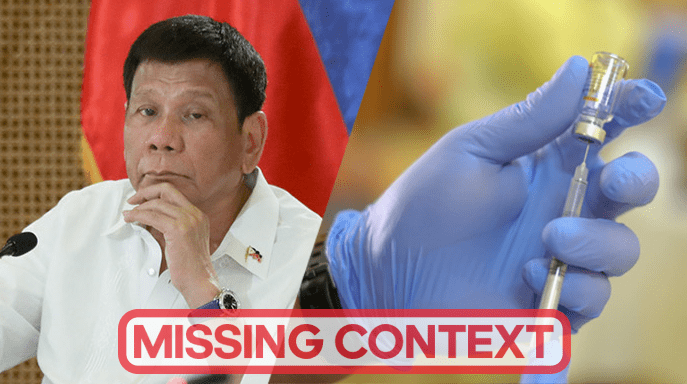
The president’s statement needs serious unpacking: legislation is needed for mandatory vaccination to be deemed a valid exercise of police power.

Rating: Missing Context
The president is correct in saying that “police power” may be invoked to implement mandatory vaccination against Covid-19, the dreaded respiratory disease that has claimed the lives of more than 48,000 Filipinos, but he left out an important element – the need for legislation.
In his “Talk to the People” address on Nov. 29, President Rodrigo Duterte claimed that he could “compel” people to get the Covid-19 jab using the “police power of the state.” Duterte said:
“Now under the police power of the state, I can compel you. It’s a… Well, Human Rights says, nandoon man tayo sa kabila. Alam mo itong Human Rights, nandoon ‘yan talaga sila sa kabila. Maskinasa Pasig, doon ‘yansila. They are always on the other side of any argument or issue just — just to be heard, just to be heard. Wala mangiba.”
Duterte’s statement needs serious unpacking. First, police power does not refer to the Philippine National Police; rather, it is an inherent power of the state acknowledged by the Constitution, concerning the environment and health, safety, and well-being of the people. Second, legislation is needed to exercise it.
A 2019 Supreme Court decision involving the Duterte government’s order to shut down Boracay Island for a six-month cleanup clarified the president’s use of police power. It said that “Police power, amongst the three fundamental and inherent powers of the state, is the most pervasive and comprehensive,” citing a 1970 ruling that defined is as the “state authority to enact legislation that may interfere with personal liberty or property in order to promote general welfare.”
The question was whether Duterte’s Proclamation No. 475 that ordered the six-month shutdown from April to October 2018 could be considered a police power measure or an enacted legislation, and the high court ruled in the affirmative.
But police power has its limits and cannot be harsh, the court said. “It has to be exercised within bounds – lawful ends through lawful means, i.e., that the interests of the public generally, as distinguished from that of a particular class, require its exercise, and that the means employed are reasonably necessary for the accomplishment of the purpose while not being unduly oppressive upon individuals,” the Supreme Court said.
To be fair, Malacañan Palace recognizes that compelling the entire population to get vaccination requires more than a presidential proclamation. Speaking to the ABS-CBN News Channel’s Karen Davila on Dec. 1, acting Palace spokesman Karlo Nograles said Congress needed to pass a law on mandatory vaccination.
“We’ll need a law, we will need a law for that,” said Nograles, who is also co-chairman of the Interagency Task Force on the Management of Emerging Infectious Diseases or IATF.
Nograles said Interior Secretary Eduardo Añowas of the opinion that local governments could pass ordinances requiring vaccination.
But the IATF was still discussing the matter and did not want to get ahead of Congress, he said. We assume the president intends to do the same; after all, Nograles as spokesman and Cabinet member is his alter ego.
This fact-check was produced by PressOne.PH as part of a fact-checking grant from the Philippine Fact-Checker Incubator (PFCI) Project. The PFCI supports news organizations to allow them to meet global fact-checking standards under the International Fact-Checking Network’s Code of Principles.
PressOne.PH believes that fact-checking is essential to combating misinformation and disinformation, and in informing and educating citizens and voters. Read more of PressOne.PH’s Fact-Checking Policy by clicking here.
The public is welcome to send feedback or requests for fact-checks at news@pressone.ph.